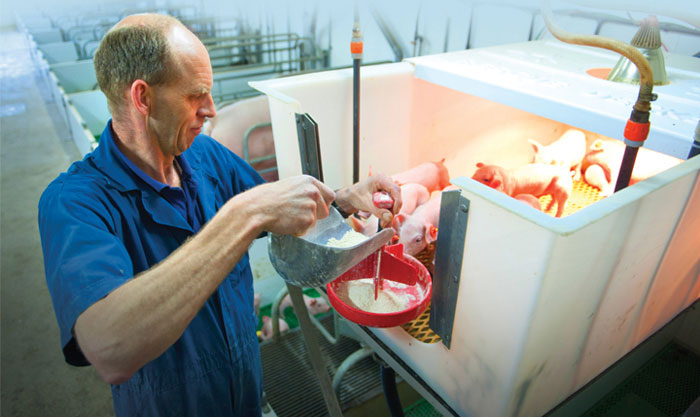Helping Breeders Improve Piglet Livability
With an inventive approach, Cargill helps breeders in the Netherlands and Germany raise healthier, more productive pigs.
January 01, 2015
Having large numbers of live-born piglets would seem like a positive thing for pig breeders. Unfortunately, while bigger litters mean more milk in general, the milk production per piglet goes down. Larger litter sizes often result in lower birth weights and slower overall growth. During its work with breeders around the world, Cargill caught on to this growing problem—most notably in the Netherlands and Germany.
For pig breeders, strength, size and uniformity are vital aspects of quality. To balance the weight of undernourished piglets, many breeders relied on foster sows, which required a time-intensive procedure to introduce the foster piglets. Even when fostering was successful, the results were varied. Other options, such as milk supplements, often caused illness, creating more health concerns.
Determined to help breeders rear as many healthy pigs as possible, Cargill’s Provimi business introduced an innovative nutrition system called Neopigg™ RescueCare in 2010. The solution featured Neopigg™ RescueMilk, a neonatal nutritional supplement made with ingredients selected for digestibility and gastrointestinal development without the use of antibiotics.
To make the supplement accessible to piglets, Cargill developed Neopigg™ RescueCup, an automatic feeding cup with a built-in nipple. The design made it easy for tiny piglets to drink, stopped the milk from flowing back into the pipe and kept the milk sanitary. Breeders installed the vessels alongside nursing sows to supplement piglets that didn’t get enough milk from the sow.
For feeding piglets without a sow, Cargill created Neopigg™ RescueDecks, temperature-controlled pens that pumped unlimited supplies of milk supplement, enabling piglets to transition easily from malnourishment to good health and helping breeders to remove foster sows from the equation entirely.
By 2010, the Neopigg RescueCare solution was implemented to breeder markets across Germany and the Netherlands, helping breeders reduce their need for foster sows, and therefore spend less time on piglet management. It also helped achieve higher, more uniform weights at weaning while lowering the mortality rate.
 [image caption] Jan Brouwer, the first Neopigg™ RescuePig user in the Netherlands, says the solution has helped lower his farm’s piglet mortality rate by 4%.
[image caption] Jan Brouwer, the first Neopigg™ RescuePig user in the Netherlands, says the solution has helped lower his farm’s piglet mortality rate by 4%.
Breeders reported that piglets continued to grow after weaning. They no longer succumbed to typical post-weaning weight loss because they were already eating from a trough. They had also received more feed before weaning, so their gastrointestinal systems were accustomed to plant-based feed. Additionally, piglets—even those that started as runts—reared in Neopigg RescueDecks were already heavier than their penmates upon entering the fattening house, and this gap only widened.
Today, Neopigg RescueCare solutions have been installed at over 100 farm sites in the Netherlands and Germany—and more than 5,000 worldwide, helping reduce piglet mortality rates by an average of 3%. By avoiding the use of foster sows, breeders also deliver more piglets per sow, which significantly increases their annual incomes and provides a better quality of life.
